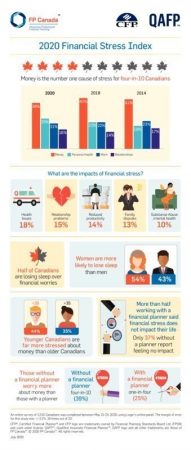
Money, stress and the global pandemic
by CM Staff
Money remains the number one cause of stress for Canadians, according to survey

2020 Financial Stress Index (CNW Group/FP Canada)
TORONTO — Canadians have ranked money as their greatest cause of stress according to the latest chapter of the Financial Stress Index, by FP Canada. The survey asked Canadians about life pressures arising from personal finance.
Money remains the number one cause of stress
Consistent with previous years, money is the number one cause of stress for Canadians by a large margin. Money (38%) outranks personal health (25%), work (21%) and relationships (16%) as the top source of stress in Canadians’ lives.
The 2020 Financial Stress Index also reveals that as Canadians age, they feel less stressed about money – with 44% of 18-to-34-year-olds listing money as their leading concern compared to one-in-four (25%) of those aged 65+.
Financial planning is linked to lower stress
Four-in-10 Canadians (38%) say that financial stress doesn’t impact their lives at all. Notably, those with a financial planner are significantly more likely to be shielded from financial stress (with 53% saying it doesn’t impact their lives at all).
Interestingly, there is little difference in the way those on an annual income of $40K to $79K and those earning $80K+, consider money as a stressor. One-in-three of both cohorts (35% and 34% respectively) said money causes the most stress in their life. Half (49%) of those earning less than $40K rank money as their biggest stressor.
The uncertainty of COVID
In 2020, four-in-10 Canadians say the COVID-19 pandemic has impacted their financial stress levels. One-in-10 note the pandemic has significantly impacted their financial stress levels.
“This pandemic has added an extra layer of financial uncertainty for Canadians,” said Kelley Keehn, personal finance educator and consumer advocate for FP Canada, in a prepared statement. “As millions grapple with the repercussions of job loss, reduced hours and market volatility, it’s more important than ever to seek out expert assistance.”
Half of Canadians losing sleep over financial worries
The survey found that half of Canadians (49%) have lost sleep over financial concerns. Younger Canadians (under 35) are more likely to have lost sleep due to money stress than those over 35 (55% to 46%). Women (54%) are more likely to lose sleep than men (43%) and those without a without a financial planner (50%) are more likely to lose sleep than those with a financial planner (38%). As expected, those who say the COVID-19 pandemic has financially impacted them, are twice as likely to say they have lost sleep.
The 2020 results for Canadians losing sleep over financial worries were the same as in 2018 (48%) and slightly down from 2014 (53%). On a more positive note, only 16% answered ‘strongly agree’ to losing sleep over financial worries in 2020, significantly less than the 28% in 2014.
Financial stress impacting other areas
When asked “how has financial stress impacted your life”, half of Canadians have felt the impact in at least one way. Specifically, health issues (18%), marriage/relationship problems (15%), reduced productivity at work (14%), family disputes (13%) and mental health/substance abuse challenges (10%) are attributed to financial stress. Nine-in-10 Canadians (88%) under 35 have at least one aspect of their finances causing them stress, compared to 75% of those over 35.
“The COVID-19 pandemic has increased financial strain in many households — especially for those who have lost their job in a sector that may not fully recover,” said Moira Somers, a clinical neuropsychologist specializing in mental and financial well-being. “It’s important to pivot and focus on actions that will restore financial well-being, such as developing or upgrading marketable skills. Taking proactive measures is a big step towards creating financial stability and confidence in the future.”